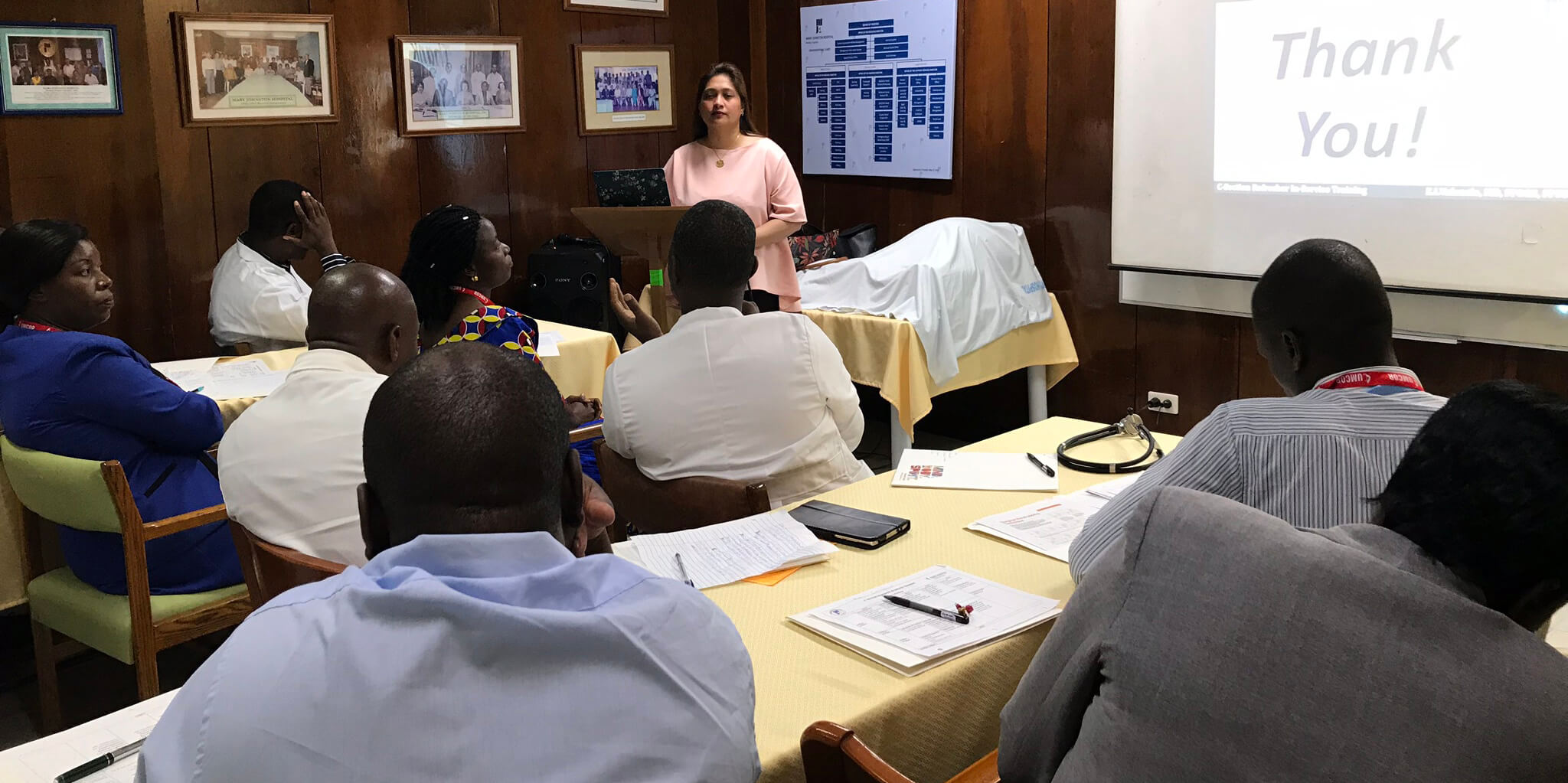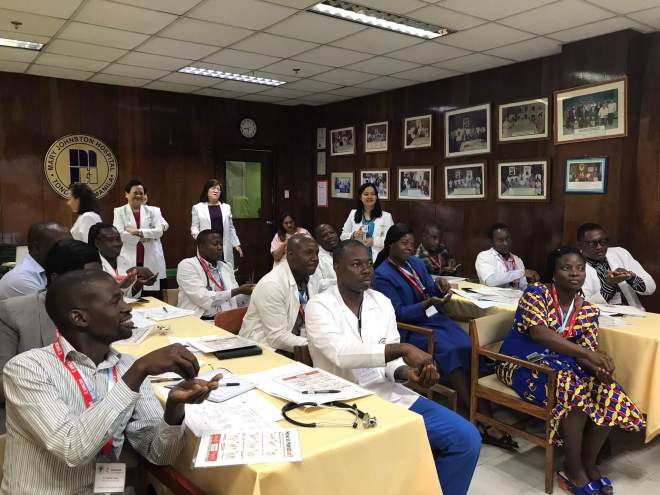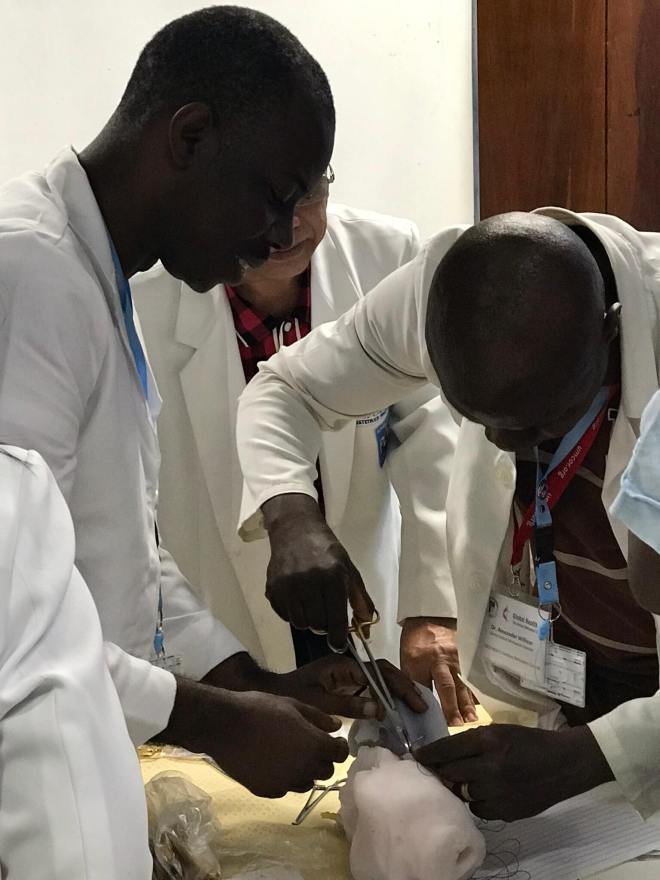
By Barbara Dunlap-Berg
April 24, 2019 | Atlanta, Ga.
Thanks to counsel and training by skilled medical professionals at United Methodist-related Mary Johnston Hospital in Manila, Philippines, eight doctors and five nurses from Africa are now better equipped to handle emergency maternity cases in their home countries.
Traveling from United Methodist missionary hospitals in Liberia, Nigeria, Sierra Leone and Zimbabwe, the 13 participants were immersed in rigorous medical training to deepen their knowledge of performing C-sections in their facilities.
One participant in the March 25-30 event was Dr. Fidel Agyei Asante, a Ghanaian physician operating out of Hatfield Archer Memorial United Methodist Hospital in Rotifunk, Sierra Leone.
“This program,” he said, “has highlighted so many things. The nature of this program being evidence-based has enlightened me and has built my confidence. I strongly believe that what I’ve been taught here is something which is fully accepted in other developed countries like the United States.”
In the U.S., one out of every three babies are delivered by cesarean section. As with any surgery, risks exist, but danger is much more prevalent in African countries, where medical staff often are not trained to do the procedure.
According to the Lancet Global Health journal, Dr. Graciela Salvador-Davila said, “maternal mortality after C-section in Africa is 50 times higher than that of high-income countries. Due to the poor access to care, many women deliver with a high preoperative risk.” Salvador-Davila is the Health Systems Strengthening technical advisor and interim director of the Global Health Unit, General Board of Global Ministries.
“The medical training,” she continued, “was a combination of didactic presentations, including case studies, skills standardizations using anatomical models and clinical observations of selected procedures, i.e., cesarean-section, obstetric ultrasound. Infection prevention and control updates and standardization were hands-on.”
In addition to Asante’s facility, participants included Ganta Hospital, Liberia; Jalingo Hospital, Taraba State, Nigeria; Kissy and Mercy hospitals in Sierra Leone; and Nyadire, Old Mutare and Mutambara hospitals in Zimbabwe.

Post-training test scores reflect progress
“Prior to the C-section refresher training,” Salvador-Davila said, “the HSS team sent an email to the African participants asking them questions concerning the current C-section situation in their hospitals, expectations of the training and what they would like answered through this training.” Most voiced concerns about infection control, intraoperative bleeding and the desire to learn new techniques.
“A pre-test was administered,” she noted, “and the average score was 60 percent, or 10 out of 17 questions. At the end of the course, the same test was administered, and the class average was 94 percent, with many receiving a perfect 100 percent.”
By strengthening and building capacity for maternal and newborn health care within missionary hospitals, Salvador-Davila said, “the training will reinforce surgical skills to perform C-sections.” A value added is the collaboration and learning opportunity to be established between United Methodist health facilities working in different settings but united through the Abundant Health Initiative.
She cited an article (“A C-Section Should Not Be a Privilege: Expanding Access to Life-Saving Maternal Care, Safe Surgery 2020”) that stated that across sub-Saharan Africa, only 7.3 percent of babies are born by C-section. Rates by individual countries are even more startling: Nigeria, 2 percent; Liberia, 3.5 percent; and Zimbabwe, 6 percent.
Maternal mortality is another concern. The World Health Organization reported that every day, approximately 830 women die from preventable causes related to pregnancy and childbirth. Ninety-nine percent of all maternal deaths occur in developing countries. Maternal mortality is higher in women living in rural areas and among poorer communities. Skilled care before, during and after childbirth can save the lives of women and newborn babies.
In post-training evaluations at Mary Johnston Hospital, participants rated the experience “above average” to “excellent” in all categories. Positive comments mentioned interactive teaching methods, evidence-based content and well-organized training.
“We wanted to build a network of young medical professionals working together beyond their countries,” Salvador-Davila said.
Her colleague, Dr. Glenn Roy Paraso, executive director of Mary Johnston Hospital, agreed. “I think the connectedness of the Methodist Church was highlighted in this training.”
‘God bless The United Methodist Church’

PHOTO: MARY JOHNSTON HOSPITAL
Asked how Global Ministries could continue to support medical staff and hospitals, participants overwhelmingly requested future training experiences. “I look forward,” Asante said, “to when this training will reach other United Methodist hospitals in Africa and, also, with time, focus on pediatric programs because, in my hospital, the mortality rate involves many pediatric cases.”
Salvador-Davila said that Global Health, through its Health System Strengthening program, hopes to replicate C-section refresher training among missionary hospitals of the Democratic Republic of Congo.
It is vital for The United Methodist Church to be involved in Global Health ministries, she added, “to help alleviate human suffering and to improve the quality and scale of health care services offered through United Methodist hospitals and clinics.”
“I’m very honored, I’m very proud, I’m very glad to be part of such a program,” Asante said. “God bless GBGM. God bless The United Methodist Church.”
Paraso called the experience “a great opportunity for us to bring our story across of connection and mission in health. This will be a good intervention to bring down maternal and neonatal mortalities as part of quality health care and be a sustainability mechanism for our African colleagues.
“The message is healing,” he said. “Every life is important. Every life counts. Every life matters.”
Mary Johnston, the only United Methodist-related hospital in the Philippines, has served for more than a century in Tondo. The majority of its patients are poor. Begun as Bethany Clinic in 1906 in response to the lack of sanitation, drinking water and proper nutrition, the hospital is credited with drastically reducing infant mortality.
Barbara Dunlap-Berg is a freelance writer and editor.

